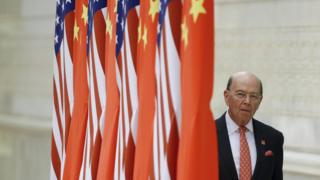US to investigate Chinese aluminium trade
 Image copyright
Image copyright
Getty Images
Commerce Secretary Wilbur Ross recently visited China
The US has announced another trade investigation, this time targeting China’s aluminium industry.
The inquiry will examine if aluminium alloy sheet is being sold below cost or with the help of government subsidies and could lead to tariffs.
The US called it an “historic” probe intended to advance President Donald Trump’s tough-on-trade agenda.
It is initiating the investigation itself, not responding to a complaint from a US company, as is usual.
US Commerce Secretary Wilbur Ross said: “President Trump made it clear from day one that unfair trade practices will not be tolerated under this administration, and today we take one more step in fulfilling that promise.”
The move comes shortly after President Trump and Mr Ross visited China.
The US imported more than $600m (£459m) in aluminium alloy sheet from China last year, according to the Commerce Department.
It said it has evidence that the imports pose a threat to US industry.
The case will now be investigated by the International Trade Commission, with final decisions expected in 2018.
Trump strategy
Under the Obama administration, the US complained to the World Trade Organisation about aluminium subsidies in China.
But the Trump administration has embraced a more go-it-alone approach.
This summer, the Trump administration also said it would investigate intellectual property theft by China.
In April, the Commerce Department launched an investigation into steel and aluminium imports on national security grounds.
It has not announced a final decision in that case. In September, Mr Ross told Bloomberg a finding would be delayed to allow Congress to focus on passing tax cuts.
Separately, earlier this year China took steps to cut back aluminium production, in response to pollution and overproduction concerns, according to industry members.

